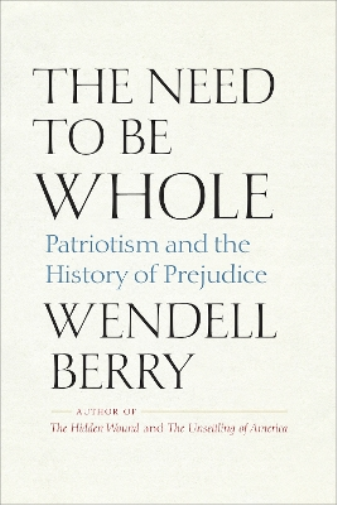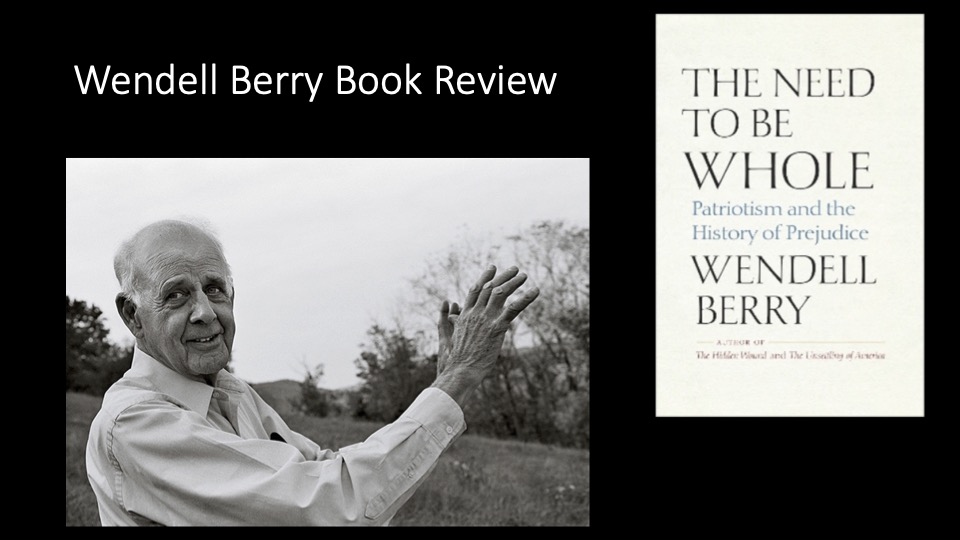Wendell Berry, The Need to Be Whole:: Patriotism and the History of Prejudice

(Shoemaker & Company, 2022), 513 pages including index and bibliography.
I came across Wendell Berry as a 21-year-old college student. I had read a review of his recent book, The Unsettling of America, and checked it out of the library. Since then, I have purchased and read 16 of his works in three genres (non-fiction, fiction, and poetry). In Barry’s latest work, he returns to themes he first laid out in The Unsettling of America (1977) and The Hidden Wound (1969). Nearly 45 years later, I have entered the latter half of my sixth decade as Berry fast approaches his ninth.
In The Need to be Whole Berry reflects on thoughts over his lifetime that involve how we get along with one another and with the land in which we’re to steward. The result is a book that, at times, wanders. It’s also a book that will anger many: conservatives and liberals. But Berry has never been one to fit into a comfortable niche of what’s popular now. He is beholden to no one. He thinks for himself. The reader can either accept or reject his thoughts.
While Berry’s subtitle suggests this is a book about Patriotism and a history of prejudice, it’s much more than that. Berry calls on his readers to love, each other and the land. While he writes about prejudice and racism, he understands the roots of both grounded in the lack of respect for work and the land. He criticizes the work philosophy of John Calhoun, who saw menial labor as beneath white gentleman in his defense of slavery. Berry criticized Calhoun for alienating the white population of the South from the land, which was just as destructive to yeoman white farmers as it was to slaves.
Interestingly, however, Berry doesn’t allow us to discard someone just because he or she made politically incorrect statements. He even concedes that not everything Calhoun did or stood for was bad, although he didn’t outline what was good about him. He does, however, delve into the good of another discredit Southerner, Robert E. Lee. Berry defends Lee as he understands Lee’s desire to defend his state. One of the places Berry wanders is the recent movement to remove statues of slaveholders. While agreeing that nothing about slavery can be justified, Berry is also against removing such statues. He’s also against just about any movement, as if he wants to be saved from such do-gooders. Nor does he have time for what passes as political correctness.
Berry’s home state of Kentucky never succeeded from the Union, yet it was a slave state and the Civil War era brought hardship and violence to it. Berry wanders around his state’s Civil War history as he attempts to make a point. If I understand Berry, while he thinks slavery is horrible, yet he finds the South’s connect to the land to be more noble than the industrial north. However, at the time of the Civil War, both north and south were mostly agrarian.
This brings to Berry’s understanding of patriotism. He understands the patriot to be linked to the land and in opposition to the “nationalism.” Drawing on the writings of George Bernanos and John Lukacs, nationalism is aggressive and based more on a myth of the people. Patriotism is more defensive and rooted not in the people but in the land. Nationalism seeks to make enemies among fellow citizens.
Another thread which Berry follows in his book is theological. He certainly understands the stewardship concept (the earth is the Lord’s, and we’re just stewards of it). His chapter on sin is an insightful commentary on the Ten Commandments. He is also critical of both conservative and liberal or progressive views on sin. Sin much more encompassing, involving our hubris, than the popular (media) sins argued in the political arena (conservatives: abortion along with regulation and taxes; liberals: racial slurs and sexual harassment). The popular sins effectively divide the innocent from the guilty, where sin divides us from God and neighbor (156).
The chapter on sin is followed by a longer chapter on forgiveness (where he discusses the current debate over statues to slave holders). He understands that freedom requires forgiveness. Otherwise, we’ll continue the battles repeatedly. Toward the end of the book, in his last chapter which is titled “Words,” he calls us to love. He acknowledges that legislating equality won’t change our hearts. Only love can do this. And for Berry, love involves both the land and its people.
There is a lot in this book, and I’ve just scratched the surface. I invite you to read the book. I’d love to discuss it with some people.


He is certainly broad in his writing scope: poetry, fiction, and non-fiction. And if he’s capable of stirring up conservatives and liberals with his work, he’s someone worth reading.
Have you read any of his work, Lee? I think he’s an American treasure.
The distinction between nationalism and patriotism is interesting and timely. On another note, I’m surprised Berry is against tearing down Confederate and slave-holder statues.
I do appreciate Berry’s distinction between nationalism and patriotism and I think it’s helpful. As for his statues, Berry tends to be against a lot of “movements” and he wants us to think about why. I think he’s right because of how he identifies sin which isn’t something your opponent does, but something everyone struggles with and therefore there we all have our faults as well as value. If we only focus on faults, would there be any monuments (and maybe that wouldn’t be a bad idea, either).
I have read all of Berry’s fiction (I started with Jayber Crow, then proceeded to read all of the Port William stories), but none of his non-fiction other than a few excerpts. I definitely need to do so. Would you recommend I go back and read some of the other non-fiction works (e.g., The Unsettling of America) before this one?
In the column I wrote for 11 years, I also angered both liberals and conservatives. I love that Wendell Berry and I have that in common.
I don’t think you’d need to read any of his earlier non-fiction works to read this one. If you have read his fiction, you’ll understand the themes he is driving at. I never owned “The Unsettling of America” (checked it out from the library). I need to review that book again as it’s been 45 years…
Those who don’t find a home in either camp, in my opinion, think for themselves (less prone to buying the party line) and are probably closer to the truth than those who just parrot whatever their “people say.
I really appreciate that. I have felt a bit “homeless” for a number of years. And I’ve become content with that.
That sounds like this book really makes you think about some things.
While I wish it didn’t wander as much as it does, there is a lot to ponder here.
He’s definitely a familiar name, but I don’t think I’ve read any of his work!
I highly recommend “Jayber Crow,” which is a very theological novel about the town’s barber.
Interesting review. Rarely is ‘patriotism’ and ‘prejudice’ coupled as anything but bad so that got my attention.
I really liked how he treated nationalism and contrasted it to patriotism. Patriotism he sees as positive, but not nationalism.